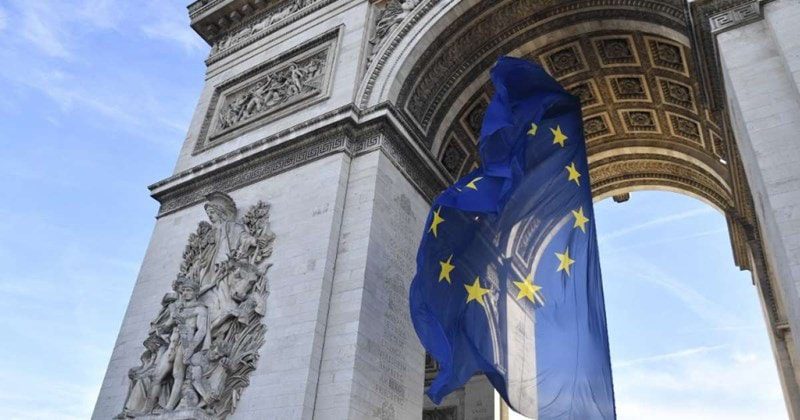
Last Friday, the French love for brisk polemic was stirred when an EU flag, marking the start of the country’s six-month presidency of the bloc, was hoisted under the Arc de Triomphe in Paris.
On Sunday, the flag was furled and taken away, Le Monde reports. According to Secretary of State for European Affairs Clement Beaune, the flag-lowering was a planned event. He assured France Inter radio that “it was scheduled that the flag was to be taken down this Sunday,” going on to say he was “very proud that this one flew for a few days.”
But Beaune’s comments have fallen flat in respect to the severe backlash the EU flag incited.
Far-right presidential candidate Marine Le Pen threatened to appeal to France’s Council of State to remove the EU flag. When it was removed, she claimed it a win for her team, saying that “the government has been forced to remove the EU flag from the Arc de Triomphe, a beautiful patriotic victory at the start of 2022.” Beaune promptly dismissed Le Pen’s remarks, countering that the government had not “given in” but that she and her sympathizers were mistaken on the matter. He pointed out that the EU flag never supplanted the French one, since the latter is not permanently displayed on the Arc de Triomphe.
Still, outpouring of objections were heard from several other politicians. Éric Zemmour, a fellow vyer for the Presidency, took to Twitter, counting the incident as the third in a sequence of outrages concerning the monument. The right-wing former columnist has been fiercely critical of incumbent President Macron’s tenure, who he de facto held responsible for the sack of the monument by the gilets jaunes and its indecorous wrapping by artist duo Christo and Jeanne-Claude.
Choice words—“Presiding over Europe yes, erasing French identity, no!”—were expressed by another presidential candidate, Valérie Pécresse (from the liberal-conservative ‘Les Républicains’ ), who asked “solemnly” of Emmanuel Macron to restore the nation’s tricolor next to that of Europe’s yellow star-studded blue square.
Other rightist critics, such as Eric Giotti, while a guest on political talk show “Le Grand Jury,” took offense to erecting the European flag on the Tomb of the Unknown Soldier which represented “an offense to all those who have fallen.” He went on to plainly state that Emmanuel Macron “doesn’t like France.”
Not all criticism came from the Right however. “It was a bad decision,” said MEP Manuel Bompard (also the campaign director of Jean-Luc Mélenchon from the ‘ecosocialist’ La France Insoumise), during a television interview on Sunday morning.
The subject of the French flag and its display, especially regarding its relation to and, indeed precedence over, the EU’s and others’,is a sensitive one in France.
In 2014, their National Assembly weighed the matter and laid out specific instructions, such as always placing the national tricolor in the middle, the place of honor. The European flag, it was decided, would come second, and would therefore have to be placed to the right of it. This weekend, however, only the EU flag was displayed.
While he has not announced he will run again (which, observers have stated, he would do late February at the latest), Emmanuel Macron considers the EU Presidency an opportunity to make his mark. After German Chancellor Angela Merkel’s withdrawal from politics, the French head of state sees even more of an opening for him, and by extension his country, to take center stage once more.
This suspected motivation has engendered criticism among his political opponents, who have accused him of electioneering, and believe he should have delayed France’s turn until after elections were concluded.
In his New Year’s Eve national address, Macron announced that “the year 2022 must be a turning point for Europe.” With an ambitious agenda for the 27-member bloc primed for implementation, he could conceivably apply that same fervor to the domestic front, should he decide to throw his hat into the ring.
The self-confessed europhile’s stated aim to craft a “powerful” Europe—in terms of defense, technology, and border security, among others—carries no small risk. Besides a still unpredictable COVID-19 situation to deal with, failure to deliver on these fronts might jeopardize his chances during elections. “He can’t get to the first round on April 10th without having obtained some results from the European presidency,” Sébastien Maillard, director of the Jacques Delors Institute, a pro-EU think-tank based in Paris, said. “That’s the challenge for him, but it can also be a real opportunity.”
His first chance at seizing this opportunity will be March 10-11th, when European leaders are set to meet in Paris to agree on a major reform of the bloc’s budget rules.
Macron should not overly rely on his efforts in the arena of European politics, a recent poll indicated. It revealed that only 49% of French citizens polled even knew their country would be taking over the EU presidency on January 1st.
